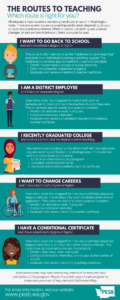Related information: Alternative routes block grant
What are alternative routes?
Alternative routes to teacher certification are designed for career changers and for individuals already working in the school system who want to earn a residency teacher certificate. Compared to a traditional route, where candidates complete their preparation program as part of a bachelor’s or master’s degree, alternative routes allow people to get their teacher certificate through shorter, more flexible, and more affordable programs. Program providers and school districts work together to offer alternative route programs. Individuals can enroll in an alternative route program through a program provider.
The four routes

Alternative route programs prepare candidates to meet the same rigorous standards and requirements as traditional bachelor’s and master’s degree programs. Programs require candidates to seek certification in a geographic or content shortage area, complete a one-year mentored internship, known as a residency, and 540 hours of student teaching.
Route 1: For district staff (e.g., paraeducators) with an associate’s degree
Route 1 is designed for district staff with an associate’s degree (or equivalent in credit hours).
Candidates enroll in a program for approximately two years to complete both their bachelor’s degree and certification requirements, including a one-year residency in the school district where they work.
Entry requirements
- Associate’s degree
- Employment at a school district when applying for a program
- District or building validation of qualifications, including one year of student interaction and leadership
- Meet the age, good moral character, and personal fitness requirements, including fingerprinting, a background check, and character references
- One attempt of the statewide basic skills assessment
Route 2: For district staff with a bachelor’s degree
Route 2 is designed for district staff with bachelor’s degrees.
Candidates enroll in a program for one to two years to prepare for certification, including intensive coursework and a one-year residency and student teaching in the school district where they work.
Entry requirements
- Bachelor’s degree
- Employment at a school district when applying for a program
- District or building validation of qualifications, including one year of student interaction and leadership
- Meet the age, good moral character, and personal fitness requirements, including fingerprinting, a background check, and character references
- One attempt of the statewide basic skills assessment, and one attempt of the subject matter assessment before student teaching begins
Route 3: For “career changers” with a bachelor’s degree
Route 3 is designed for individuals with a bachelor’s degree, who are not employed in the district at the time of application.
Candidates enroll in a program for one to two years to prepare for certification, including intensive coursework and a one-year residency and student teaching in a school district.
Entry requirements
- Bachelor’s degree
- External validation of qualifications, such as reference letters and letters of support from previous employers. This includes demonstrated experience with students or children.
- Meet the age, good moral character, and personal fitness requirements, including fingerprinting and a background check
- One attempt of the statewide basic skills assessment, and one attempt of the subject matter assessment before student teaching begins
Route 4: For district staff with a bachelor’s degree and a limited certificate
Route 4 is designed for individuals with a bachelor’s degree, who are employed in the district with a limited certificate.
Candidates enroll in a program for approximately one year to prepare for certification, including intensive coursework and a one-year residency in the school district where they work as a teacher with a limited certificate.
Entry requirements
- Bachelor’s degree
- Employment at a school district with a limited certificate, such as a conditional or emergency substitute certificate, when applying for a program
- External validation of qualifications, such as reference letters and letters of support from previous employers. This includes demonstrated experience with students or children.
- Meet the age, good moral character, and personal fitness requirements, including fingerprinting, a background check, and character references
- One attempt of the statewide basic skills assessment, and one attempt of the subject matter assessment before student teaching begins
Find an alternative route program
Multiple providers offer alternative route programs across Washington State. Search for alternative route programs using the find an alternative route program tool.
Admission
Each alternative route program has its own application process and entry requirements, in addition to the statewide requirements. Contact programs directly to learn more.
Eligible veterans or national guard members who meet an alternative route program’s entry requirements will be given admission preference.
Program cost
Each provider sets the tuition for its alternative route program. Contact the programs directly to learn more.
Some providers are recipients of the Alternative Routes Block Grant (ARBG), which provides funding to programs and their district partners to support candidates. Contact awarded programs directly to learn more. Find additional resources for financial assistance at TeachWA.org.
Resources
For future teachers
For program providers
- Alternative route priorities
- Adding or changing an alternative route program
- Memorandum of Agreement (MOA): an agreement created by alternative route program providers in partnership with the school districts; ESDs; and tribal compact, charter, and private schools that outlines the agreed-upon expectations to implement an alternative route program. All alternative route program providers must maintain current MOAs with their partners.
- Alternative route rules
